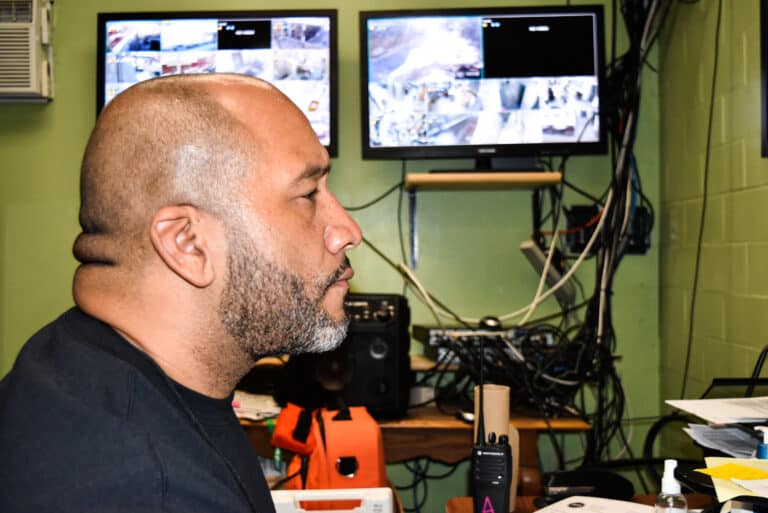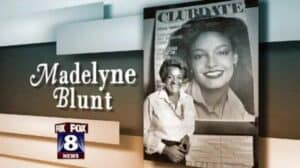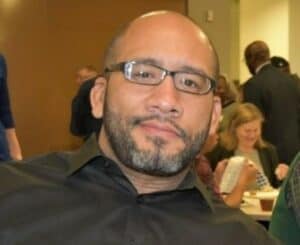Dave Blunt

Despite a past inclination to “enjoy a good dust-up,” David is a man focused on the humanity of every individual he meets. Dave ensures this understanding of humanity is at the heart of the de-escalation training, Handle with Care, that every staff member is required to take at 2100. David shares a truck metaphor to capture his philosophy for helping the people he serves. “I tell staff to assume that all clients have a semi-truck filled with personal baggage and trauma when they come into the facility. I say, if you don’t have the experience, skill set, or desire to help them unload their truck, at the very least, don’t add anything to it.” Dave guides his staff in doing no harm, handling everyone, across the board, with care…even when help might not be possible yet.
I Was a Bonehead.
When I was younger, I wasn’t a criminal, per say. Yet, I suffered from poor decision making. Don’t get me wrong, there was some criminality to it. Even though I was brought up in an impoverished area, I actually came from a very stable home. Mom worked. Pops worked. We were middle class. I had friends who came from broken homes. One or two friends even had some issues with food insecurity. I didn’t have those issues, so why was I out doing what I was doing?
 While my family was out working, they were trusting that I was making good decisions, but I was not. Before then I was in a golfing program every weekend. That actually was my grandmother’s choice. My grandmother was a prominent member of the community. She owned a magazine, ClubDate Magazine. I was around people who a lot of my friends weren’t. I grew up with people like Arnold Pinkney, George Frazier. I used to call WKYC News anchor, Leon Bibb, “Uncle.” These were my grandmother’s friends, I was constantly around them.
While my family was out working, they were trusting that I was making good decisions, but I was not. Before then I was in a golfing program every weekend. That actually was my grandmother’s choice. My grandmother was a prominent member of the community. She owned a magazine, ClubDate Magazine. I was around people who a lot of my friends weren’t. I grew up with people like Arnold Pinkney, George Frazier. I used to call WKYC News anchor, Leon Bibb, “Uncle.” These were my grandmother’s friends, I was constantly around them.
But when I had a chance, a taste of freedom, I ran with it.
My grandmother would say, “He doesn’t need that freedom right now,” when I was 12 or 13. “He needs to be driven to school. He shouldn’t be left to his own devices.” My grandmother was building a cocoon around me, not to shelter me but because she knew what was out here. My mother was a lighter hand.
I didn’t become a bonehead though until the age of 16. Then, I completely screwed up. I grew up in East Cleveland, top of Superior Hill. No matter how safe home was, I just wanted to run the streets. For some reason, the lure of the streets seemed a lot more attractive. So, you know, I ran the streets, started selling drugs, carrying guns.
My grandmother actually saw a transaction at one point (“Jesus,” Dave sighs, remembering this.) My grandmother is very strong, very strong, and I had never seen my grandmother get emotional until that day. I’m about 17, 18 at this point. She’s like, “That’s not what I’m doing here. I’m breaking my back, I’m forging ahead, and you’re taking us back!” She started crying. There’s still a lot of racism in 1989, 1990, and she’s a black woman, so double minority. A lot of the rooms she was in, she wasn’t supposed to be in. She knew how to carry herself, very eloquent speaker, you know. She was forging some paths. She was like, “Listen, I’m not dealing with this shit so that you can be out here and be this misfit.” She was in tears, and it affected me. Did it change me? It did not. But, it affected me…at least to let me know my grandmother was human.
Was your Dad in your life?
My stepfather was from my earliest memories. Beautiful man. My biological father was not. I would see him. It’s not like I didn’t know who he was, but it just wasn’t his thing being a dad. So, I was in the streets doing just boneheaded stuff…fighting in the neighborhood, stuff like that. I had a few auto issues. I was in the back seat of a stolen car. We were pulled over, and we took off running. Got caught. Very petty stuff. Eventually, like most things, you start to get this sense of “I’m untouchable” and start to graduate to more major things. That’s when I was dealing drugs, had the guns.
I chose to be part of the problem.
The neighborhood we were in started to turn. And the thing I realize now at age 47, I was a part of that turn. The top of Superior Hill was a nice area. It was a stone’s throw away from Cleveland Heights. My home was 7 or 8 houses from Cleveland Heights, but I went to school in East Cleveland. We were part of that turn in the neighborhood, selling drugs, hanging out in the park at the end of the street…fighting and guns.
But oddly enough, I didn’t end up going to prison until I was 29. Looking back, hindsight being what it is, Karma will have its perfect way. God will catch up. I ended up going to prison for whooping my son. My son was very young, 4 or 5 at the time. I used the belt…very conventional corporate punishment in black communities; I’m sure in other communities as well. I put belt to butt, nothing odd. But he’s light skinned, so he bruised up a little bit. His mom took him to the emergency room. It all kind of went downhill from there.
I was trying to make sense of it, sitting in the cell. Like, “Why was I here?” At the time my criminality had stopped. I was a grown man. I was climbing the ladder. I actually worked at Cleveland Job Corp as the discipline officer. I was the one who decided when a participant did something wrong. I was the one who decided if they stay in the program or get a warning.
I remember thinking, like no lie, “I left that life. Why in the hell am I here now?” I couldn’t understand it. What I used to wrap my mind around it was the thousand things I got away with. That’s coming back to the part about Karma and God, all the things I got away with and even though I stopped the criminality, my decision-making skills hadn’t improved. I was still doing bonehead stuff. Not criminal stuff but bonehead.
Going back a little, what made you wear off the criminality?
I had some friends get murdered…die. I became a father at 17 before I was really a man. I had two by 19. So, I had responsibility…weird how responsibility can be born out of irresponsibility.
A pivotal move
Also, the thing that helped get out of criminality was proximity. I was living with my mother and we moved to an area I wasn’t familiar with, down on 93rd and Chester. Right down from Cleveland Clinic. It wasn’t my neighborhood. I did from time to time go back to my old neighborhood, but you know, I started working. I got to take care of my kids. Started spending time with them. Kind of like anything else: if you pick up something with two hands, right, eventually you’ve got to put something else down.
Then I started in security and became a discipline supervisor. Doing that and whooping my son and I’m sitting in prison behind a cinder block wall. “I left that criminal life. Why in the hell am I here now?”
A new low
Any man who tells you that he didn’t get emotional, at least on his first trip to jail, is lying. At some point during somebody’s stay, they’re like “Yo.” They get emotional. I couldn’t understand it. I was still doing bonehead stuff. Not criminal stuff but bone head.
Dave pauses and says, You know what, I’m lying. There was criminal action, but with so many things I’d done, I guess I discounted it, but it was criminal.
Okay, so short story: I was dating a girl and she racked up a lot of parking tickets. It was my car so when I went to get my plates, they said, “You’ll need to pay these tickets first,” like a few hundred dollars. My tags were expiring in next couple days. So, I paid a guy I knew 25 bucks to steal me a 30-day tag, to give me time to get paid. Then I could take care of my parking tickets.
I was picking up my new girlfriend at the airport and was pulled over in Lyndale. They initially charged me with identity theft but negotiated it down to receiving stolen property. Again, nose had been clean for many years. Judge was like, “You’re an idiot. Take 6 months’ probation.” During the 6-month probation is when I whooped my son. The judge was like “Yo, you’re an idiot. So goodbye.” I ended up going to prison for a year and a half.
Which prison?
Grafton. Even though I was a bonehead, I never had been to prison. I had friends who had been in prison. I can look back now and see God in my life, but I couldn’t see God then. Grafton was directly across the street from Lorain, which means my proximity to family for visits. In the prison cycle, the further you are from home, the harder your time is going to be because the further from your support system. So, people were like, “Man, you got lucky, blah, blah, blah,” because Grafton was like 40 minutes from Cleveland.
So, I went to Grafton. Grafton was very slow and the large majority of people were those who’d already done 15 years. They didn’t want any trouble. They just wanted to do their time and go home at some point or they were short-timers like me…18 months, wanting to get this over with.
I quietly did my time, did some things that kept me busy and that’s where my connection with God came in. I started reading the Bible a little bit more. Anyway, fast forward. I did a year inside Grafton and 6 months at Harbor Light, Salvation Army at 18th and Prospect. It’s what we say is a post release center. Did the last 6 months there.
That was hell. It was run by Salvation Army, but the day to day people just weren’t easy people. The majority of staff there were just bitter, vindictive. I was still an inmate, and they were enforcing the rules. That wasn’t the problem. It wasn’t the what. It was how they were enforcing it; very punitive, very nasty.
Allowed me to be a human being
An important side bar of this… that’s where I met Cynthia Johnson, on staff now at LMM Family Overflow Shelter. I remember her because she was just very pleasant. We called her CJ. I’ve told this story to my 2100 staff. She still kept the rules, didn’t let us get away with stuff, but it was the way she just allowed me to be a human being. I wasn’t necessarily an inmate, I wasn’t number 385501.
I remember the first time I was here at 2100. My desk was in the corner, and I was the assistant to the Operations Director at the time. Someone comes to the office door and says, ‘A friend needs a job.’ They say CJ’s name, and I turn around and say “You’re hired,” even though that wasn’t my place to hire at that point. It’s not like we were friends. It’s that I had witnessed already how she had responded to a person in an ugly situation, she would respond with…
Dave cuts off, pulled away by an actual ugly situation down the hall. “Let me respond to this real quick,” he tells me. I listen, the yelling subsides with someone telling Dave their side of the story. Dave returns energized. He’s in his element, de-escalating tension.
For 15 years I was a bouncer and that’s where my de-escalation skills were honed. Don’t get me wrong, I still enjoyed a good dust-up and unfortunately still do, but I also knew I didn’t want to fight every night.
Were you instrumental in the shelter’s de-escalation policy?
I was the first teacher of it, but the policy and training program, Handle with Care, was actually at LMM’s Youth Services first.
Handle with Care is a national behavior management program in verbal de-escalation, safe physical management, passive holding methods for aggressive behaviors.
I’m a physical guy. I played football, I wrestled, I was a bouncer, you know, I wrestle with my sons, I wrestle with my grandsons. Even now, I’m in that whole physicality. So, when I went into the Handle with Care training, I loved it, coming from a bouncer’s standpoint, I’d done security at the Job Corp, so it was who I am. I did executive protection, a body guard, for the rap group in the 90’s, Bone Thugs-N-Harmony. Security is just who I am. I gravitated to Handle with Care because it was combined with intent of protecting people…talking people down in a reasonable way. As I picked up those skills, that thing from CJ stayed with me. Realizing I don’t have to be an asshole to enforce the rules.
After the first training I cornered Mike Sering, Director of 2100. “If you bring that training here, I’d like to be an instructor.” He said they were still figuring it out. A couple times afterwards, “About that program… I’m interested.” Eventually, Sering said “We’re going to bring the program here.” I got certified as an instructor. I also helped draft the shelter’s use of force policy, how to use it, when to use it, and when it’s out of bounds.
 I was here for 7 years and left for 4. I took Handle with Care to the agency that I went to, Volunteers of America, in partnership with the VA. VA does the clinical side, VOA does the operational and support services. VOA was very interested, but they have a very strict hands-off policy so the only thing we could do was de-escalation. That is where I honed my teaching skills in de-escalation professionally.
I was here for 7 years and left for 4. I took Handle with Care to the agency that I went to, Volunteers of America, in partnership with the VA. VA does the clinical side, VOA does the operational and support services. VOA was very interested, but they have a very strict hands-off policy so the only thing we could do was de-escalation. That is where I honed my teaching skills in de-escalation professionally.
When a new staff member at 2100 is trained in Handle with Care, day one is de-escalation; day two and three are all hands-on. Just because there are so many maneuvers, so many techniques, and they’re complicated, so we give more time to that.
My walk caught up with my talk
My 4 years away from 2100 allowed me to grow in different ways. When I left I knew nothing about trauma, individuals’ trauma, and I was only 60% proficient in teaching de-escalation. At VOA we were forced to learn about de-escalation and about trauma. The program director is a clinician, and we bumped heads a lot because I’m a disciplinarian. I’m big on black and white, so I needed to learn that aspect. Smoothed some of my edges.
I always had an affinity for 2100. When I left, I didn’t know I was coming back, but Somebody knew. God knew that I would need certain smoothing and growth to come back. Fast forward, I still teach the hands on, but not nearly as much as I teach the de-escalation. Now, when I talk to the 2100 monitors, I’m 70% about customer service, de-escalation, trauma informed care. I’m not proficient like a clinician in trauma, but I’m aware people have trauma and people manifest trauma in different ways. When I left it was, “This guy’s an asshole, he has to go.” Now it’s “Ok, this guy still might have to leave. But obviously, something happened to him. There’s a cause and effect.” We deal with him differently. Because what he did was so egregious, he still has to be sanctioned, but we’re not necessarily tossing him out. I tell the staff, even if you have to go hands-on, don’t get emotional about it. You could hurt the individual. The staff has become professional about it and not emotional about it.
I told staff this yesterday, the population here is extremely challenging. I get it, but in those moments, try to remember what we’re really supposed to be doing here: providing a safe environment for guys to start putting their pieces together.
When I first walked in the door of 2100 as a part-time monitor, I knew something was in me, but at first this was a survival job for wife and family. Later, because of this opportunity of working here, I started buying in. One of the things I like to say is, “My walk caught up with my talk.” Once I bought in, I went the extra mile. When I was tired, when I didn’t want to be bothered, I’d make the extra effort to take care of somebody else. But it did take an entire evolution to get there.
Dave pauses and says with gravity, You know what, at the end of the day, I get to go home and I want these guys to be able to do the same. This gets to the core of who David has become: a person who cares, even “longs” for the well-being of others at 2100. This is why he signs every piece of correspondence with the mantra of those who do this work: Housing is a Human Right.


